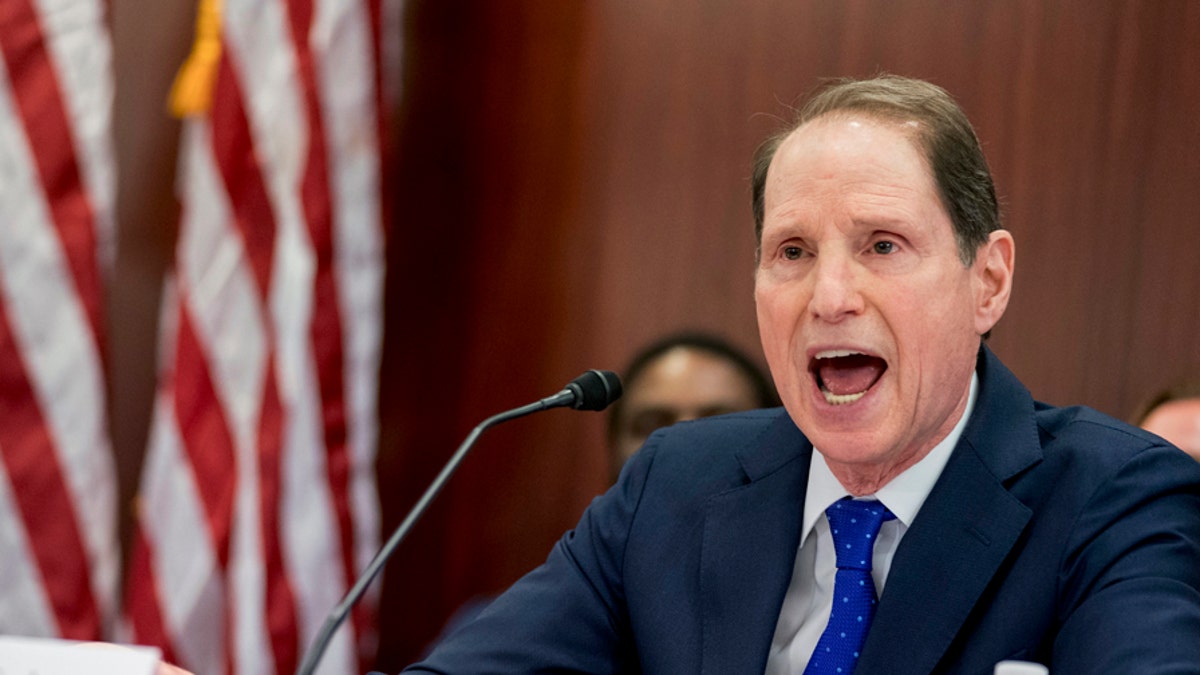
Sen. Ron Wyden, D-Ore., the top Democrat on the Senate Finance Committee speaks during a House and Senate conference after GOP leaders announced they have forged an agreement on a sweeping overhaul of the nation's tax laws, on Capitol Hill in Washington, Wednesday, Dec. 13, 2017. Democrats objected to the bill and asked that a final vote be delayed until Sen.-elect Doug Jones of Alabama is seated. (AP Photo/Andrew Harnik) (Copyright 2017 The Associated Press. All rights reserved.)
House and Senate Republican leaders forged ahead Wednesday on a tax reform deal including tax cuts for American families and corporations, though not without high-profile opposition from Democrats who used a public session to repeatedly decry the plan as a “farce” and a “scam” – while trying to delay a final vote.
Congressional Democrats threw up rhetorical roadblocks during a meeting of the House-Senate Conference Committee, which is tasked with completing a final version of tax legislation.
“Nobody should mistake this conference for a serious debate -- not when Republicans and special-interest lobbyists have already wrapped up the real talks in secret,” Oregon Democratic Sen. Ron Wyden said. “What’s happening today is a sham.”
He was preceded by Massachusetts Rep. Richard Neal, who like other Democrats on Wednesday demanded leaders of the GOP-controlled Congress delay a final Senate vote on the projected $1.5 trillion tax plan until Alabama Democrat Doug Jones joins the chamber in January, after his upset election win cut Republicans’ majority to one seat.
“This is a farce,” barked Sen. Bernie Sanders, a Vermont independent.
South Dakota GOP John Thune disputed claims that Republicans worked in secret, saying they’ve held more than 70 hearings on the matter in recent years.
“A lot of these are Democrats’ ideas and Republicans’ ideas,” Thune, a member of GOP Senate leadership, said at the hearing. “So anyone who suggests this hasn't been regular order process is just missing the facts.”
Still, House and Senate Republicans brimmed with bridled optimism about passing the most comprehensive tax reform plan in roughly three decades that would also give them and President Trump a major legislative win ahead of next year’s congressional elections.
“We will pass this legislation,” Texas GOP Rep. Kevin Brady, chairman of the tax-writing House Ways and Means Committee, said. “We’ll continue to consider the best ideas of the House and Senate. … We rejected simply tweaking a few provisions of America’s monstrous tax code. Instead we put it all on the table.”
The conference committee is working to reconcile differences in House- and Senate-passed bills, with the aim of getting a final version to the floors of each chamber by next week.
Thomas Barthold, the Joint Committee on Taxation’s chief of staff, described the proposed changes as “substantial.” He noted at the meeting that both chambers double the so-called “standard deduction” on annual tax filings, and that the House bill has four tax brackets while the Senate has seven.
Legislative aides told Fox News that House and Senate negotiators, or conferees, are still working on a final product and that the chamber will hold final votes by early next week.
Still, several key elements of the bill on which they have agreed “in principle” emerged Wednesday.
House and Senate negotiators agreed to expand a deduction for state and local taxes to allow individuals to deduct income taxes as well as property taxes. The deduction is valuable to residents in high-tax states like New York, New Jersey and California.
Negotiators also agreed to set the corporate income tax rate at 21 percent, said two congressional aides who spoke on condition of anonymity because they were not authorized to publicly discuss private negotiations. Both the House bill and the Senate bill would have lowered the corporate rate from 35 percent to 20 percent.
Business and conservative groups lobbied hard for the 20 percent corporate rate. Negotiators agreed to bump it up to 21 percent to help offset revenue losses from other tax breaks, the aides said.
Other aspects of the bill include cutting the top tax rate for individuals from 39.6 percent to 37 percent in a windfall for the richest Americans. The reduction is certain to provide ammunition for Democrats who complain that the tax package is a massive giveaway to corporations and the rich.
The top tax rate currently applies to income above $470,000 for married couples, though lawmakers are completely reworking the tax brackets.
They also agreed to let homeowners deduct interest on the first $750,000 of a new mortgage, down from the current limit of $1 million.
Both the House and Senate bills would scale back the deduction for state and local taxes, limiting it to $10,000 in property taxes. California Republicans pushed to amend the bill to enable individuals to deduct state and local income taxes as well as property taxes.
President Trump spoke before TV cameras twice Wednesday, prodding Congress to act in a matter of days.
“We are very close to a legislative victory,” he said at the White House, after meeting with the Republican conferees. “We are very, very close. … For me this is very simple: This is about middle-class tax cuts and jobs.”
The Associated Press contributed to this report.












































